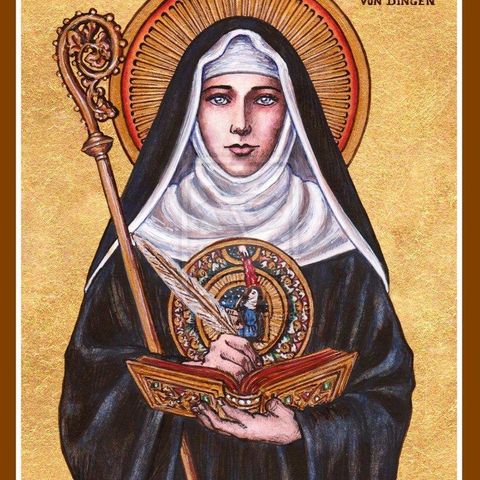Hildegard of Bingen: Doctrine of the Divine Feminine in Nature
Mar 3, 2024 ·
59m 48s

Download and listen anywhere
Download your favorite episodes and enjoy them, wherever you are! Sign up or log in now to access offline listening.
Description
Check out the Divine Feminine App! https://thedfapp.com/v2/dashboard#a_aid=Chthonia This week we continue the series on Female Christian Mystics with the polymath saint Hildegard of Bingen. Hildegard began having spiritual visions at...
show more
Check out the Divine Feminine App!
https://thedfapp.com/v2/dashboard#a_aid=Chthonia
This week we continue the series on Female Christian Mystics with the polymath saint Hildegard of Bingen. Hildegard began having spiritual visions at age 3, and was in a convent by age 8, where she was taught to read and write in Latin. She was an acclaimed mystic, philosopher, botanist, natural healer, and musician. She invented her own language and alphabet called Lingua Ignota. Hildegard's mystical revelations included the idea that nature was not imperfect, but a manifestation of God as Divine Feminine in our world. She was urged to write down her visions, though she also conveyed her experience through music, believing that celestial song existed "before Eden". We look at the traits of this remarkable medieval woman, her fierce independence with respect to Church authorities, and what her experiences say about female mystical experiences.
Links:
Music (chant with Lingua Ignota)
https://www.youtube.com/watch?v=Ua4C2mzWfNQ
Lingua Ignota:
https://en.wikipedia.org/wiki/Lingua_ignota
show less
https://thedfapp.com/v2/dashboard#a_aid=Chthonia
This week we continue the series on Female Christian Mystics with the polymath saint Hildegard of Bingen. Hildegard began having spiritual visions at age 3, and was in a convent by age 8, where she was taught to read and write in Latin. She was an acclaimed mystic, philosopher, botanist, natural healer, and musician. She invented her own language and alphabet called Lingua Ignota. Hildegard's mystical revelations included the idea that nature was not imperfect, but a manifestation of God as Divine Feminine in our world. She was urged to write down her visions, though she also conveyed her experience through music, believing that celestial song existed "before Eden". We look at the traits of this remarkable medieval woman, her fierce independence with respect to Church authorities, and what her experiences say about female mystical experiences.
Links:
Music (chant with Lingua Ignota)
https://www.youtube.com/watch?v=Ua4C2mzWfNQ
Lingua Ignota:
https://en.wikipedia.org/wiki/Lingua_ignota
Information
| Author | Brigid Burke |
| Organization | Brigid Burke |
| Website | - |
| Tags |
Copyright 2024 - Spreaker Inc. an iHeartMedia Company
